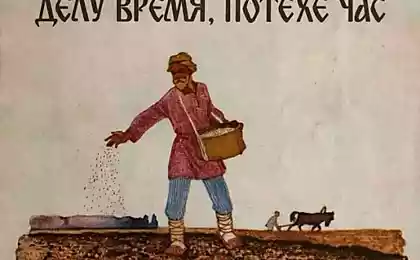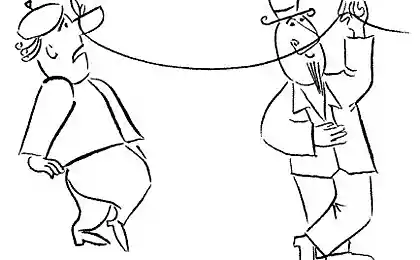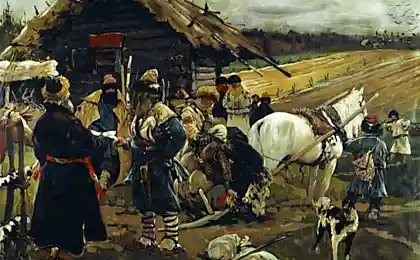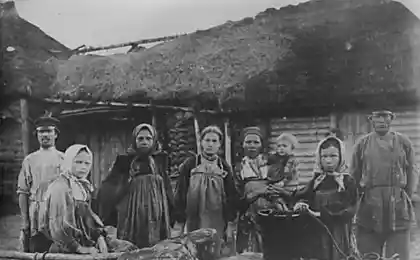1321
Where did sayings
Similar phrases we use in daily speech, absolutely not thinking about their original meaning and origin. Why is the last warning, the Chinese? Who is quiet glanders? And why successful business should be burned?
Where went the expression ... (13 pics + text)
Russian catch phrases and their origins (10 pics + text)

Reach Handle

In ancient Russia rolls baked in the shape of the castle with a round bow. Citizens often bought rolls and ate them on the street, holding the bow, or a pen. For reasons of hygiene in food handle itself did not use, and give it to the poor, or thrown to be devoured by dogs. According to one version, about those who are not averse to eat it, saying he reached the pens. Today, the expression "get to grips" means absolutely down, losing human form.
Sidekick
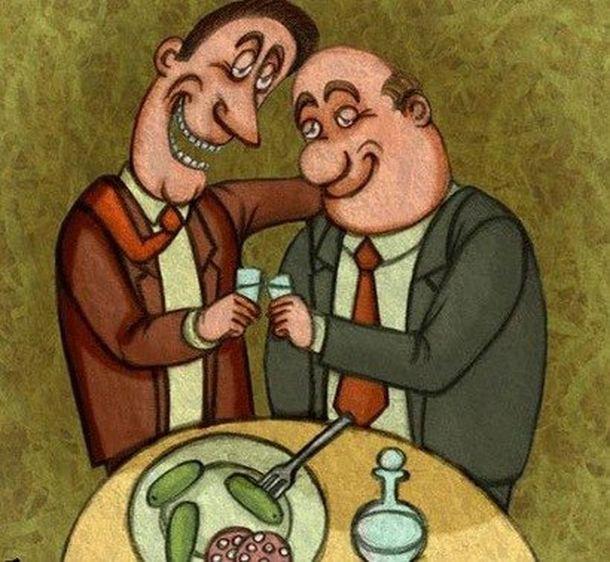
The old expression "pour over his Adam's apple" meant "to drink", "drinking alcohol." Hence formed idiom "sidekick", which is now used to refer to a very close friend.
Pour on the first day of
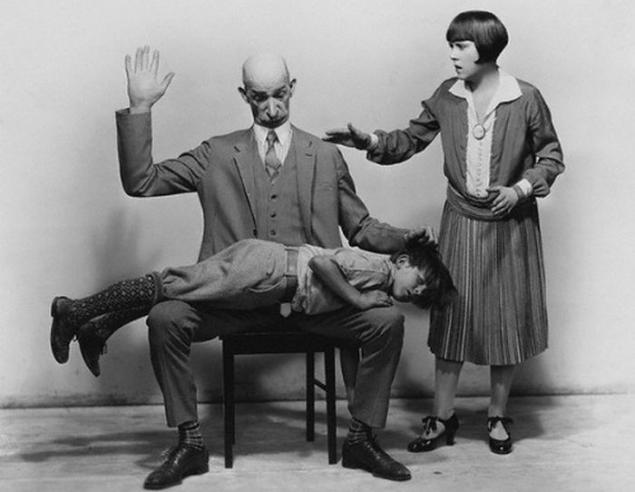
In the old days, students at the school are often flogged, often even without any guilt offense. If the teacher showed a special zeal, and the student got it especially hard, he could release from further flaw in the current month until the first of next month. That's the expression, "to pour on the first number».
Trapped
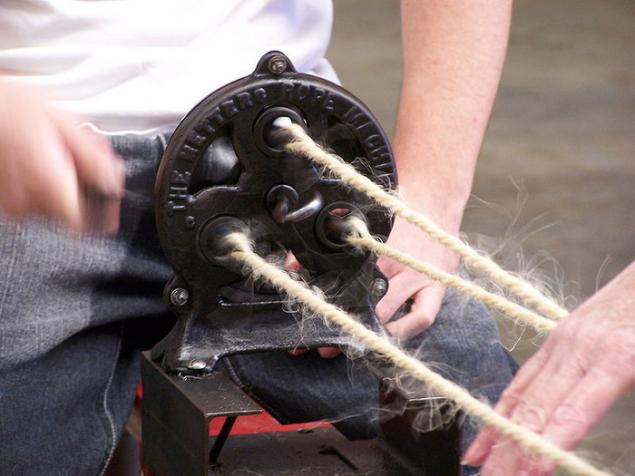
Prosak formerly called special machine for weaving ropes and ropes. He had a complex structure, and so much wrung strands that getting into a dress, hair, beard could cost a person their life. It is from such incidents occurred the expression "goof", which today means to be in an awkward position.
Last warning

In 1950-1960-ies American planes often violated the airspace of China for exploration. Chinese authorities recorded each violation and each time sent out through diplomatic channels, "warning" the United States, but no real action for them should not have, and the expense of such warnings was conducted hundreds. This policy has led to the appearance of the phrase "last Chinese warning" meaning threats without consequences.
Hang dogs

When the person blamed, accused of anything else, you can hear the expression, "hang dogs on him." At first glance, this phrase is completely illogical. However, it is associated not with an animal but with another meaning of the word "dog" - bur, bur - now almost do not drink.
Sly
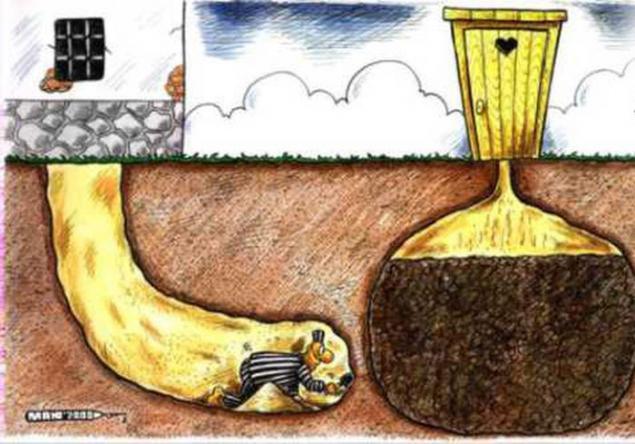
Sape word in French means "hoe". In the 16-19 centuries the term "sapa" refers to the way we digging a trench, ditch or tunnel to approach the fortifications. The saps the walls of the locks are sometimes placed bombs of gunpowder, and specialists trained to do it, were called sappers. A concealed from digging was undermining the expression "on the sly", which today is used to connote a careful and discreet action.
Big shot

Most experienced and strong Burlacu, going to the first strap, called bump. It turned into an expression of "big shot" to refer to an important person.
Case burned

Previously, if a lawsuit disappeared, the man could not show a legitimate charge. Cases are often burned, either by the fire in the wooden buildings of the courts, or by arson for a bribe. In such cases, the accused said: "It's burned." Today this expression is used when we talk about the successful completion of a major undertaking.
Go in English

When someone leaves without saying goodbye, we use the term "left in English." Although originally it was thought up by the English idiom, and it sounded like 'to take French leave' («leave in French"). It appeared during the Seven Years' War in the 18th century in mockery of French soldiers run away from the location of the part. At the same time the French have copied this expression, but against the British, and in this form it was fixed in the Russian language.
Blue Bloods

The Spanish royal family and the nobility were proud of the fact that, unlike ordinary people, they are descended from the West ready and never mingled with the Moors, penetrated into Spain from Africa. Unlike smuglokozhih commoners, pale skin representatives of the upper class blue veins stood out, and so they called themselves the sangre azul, which means "blue blood." From this expression to describe the aristocracy has penetrated into many European languages, including Russian.
And no brainer

The source of the phrase "no-brainer" - Mayakovsky's poem ("Clearly, even a hedgehog - / This Peter was a bourgeois"). Widespread it has received the first novel by Strugatsky in "Land of Crimson Clouds", and then in the Soviet boarding schools for gifted children. They recruited teenagers who left to study for two years (classes A, B, C, D, E) or one year (classes E, F, I). Disciples of one-stream and named - "hedgehogs". When they came to the orphanage, dvuhgodichniki already ahead of them on a non-standard program, so at the beginning of the school year the phrase "no brainer" was very important.
Wash up bones

In the Greek Orthodox, as well as some of the Slavic peoples it was the custom of secondary burial - the bones of the deceased were removed, washed with water and wine and laid back. If the corpse found neistlevshim and swollen, which meant that during the life of this man was a sinner, and on it is a curse - go out at night from the grave as a vampire, vampire, vampire and destroy people. Thus, the rite of rumor-mongering was needed to ensure that no such spell.
Nail program
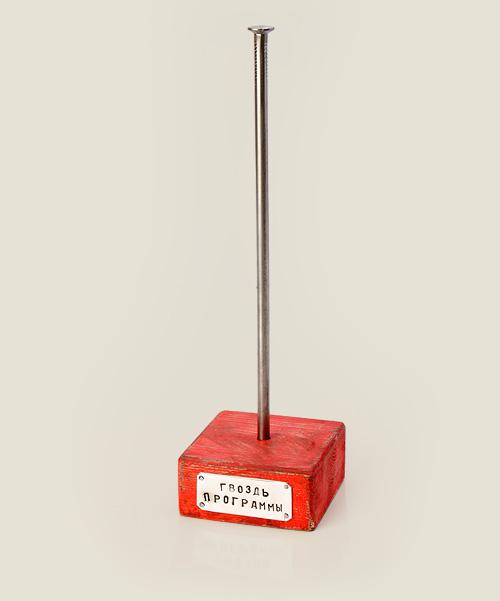
The World Exhibition of 1889 in Paris was timed opening similar to nail the Eiffel Tower, which created a sensation. Since then, the language has become the expression "highlight of the program».
By hook or by crook

In the old village women after washing "rolled" clothes using a special rolling pin. Well laminated linen proved squeezed, ironed and clean, even if the laundry was not very high quality.
Newspaper duck

"One scholar, bought 20 ducks, immediately ordered to cut one of them into small pieces, which fed the other birds. A few minutes later he did the same with another duck and so on, until there was one that devoured so 19 of her friends. " This review was published in a Belgian newspaper humorist Cornelissen, to make fun of the credulity of the public. Since then, according to one version, called false news "newspaper ducks."
Seven Fridays of the week

Earlier Friday was a free day from work and, as a consequence, market. On Friday, receiving goods, promised the next market day relying give him money. Since then, to refer to people who do not fulfill the promise, saying: "He has seven Fridays in the week».
Scapegoat

According to the Hebrew rite, on the day of the remission of sins the high priest laid his hands on the head of a goat and thereby laid on him the sins of the people. Then led away the goat in the Judean desert and released. Hence the expression «scapegoat».
Fiasco

Fiasco - means: to experience failure, break on the way to the goal. However, the word "fiasco" in Italian means more two-liter bottle. How could create such a strange combination of words and how it acquired its modern sense? There is an explanation. It was born out of the failed attempt of the famous Italian comedian Biankonёlli play before an audience cheerful pantomime with a large bottle in his hand. After the failure of his word "fiasco Biankonёlli" received acting value of failure, and then the very word "fiasco" has come to mean failure.
Why beginners called "kettles»

Tea - an inexperienced user, the person who does not know how it is advisable to use a personal computer in the right amount for it. The term came from mountaineering. Kettle experienced climbers called freshman, made his first ascent to the summit of the mountain. Typically, these people are first of all do not commit the necessary actions for the Development of the camp, and pose for photographers, emphasizing one hand in his side, and another set aside sideways, leaning on an ice pick, ski poles and so on. E., Causing their silhouette is strongly reminiscent of tea. < br />
Source: zanimatelno.forblabla.com
Where went the expression ... (13 pics + text)
Russian catch phrases and their origins (10 pics + text)

Reach Handle

In ancient Russia rolls baked in the shape of the castle with a round bow. Citizens often bought rolls and ate them on the street, holding the bow, or a pen. For reasons of hygiene in food handle itself did not use, and give it to the poor, or thrown to be devoured by dogs. According to one version, about those who are not averse to eat it, saying he reached the pens. Today, the expression "get to grips" means absolutely down, losing human form.
Sidekick

The old expression "pour over his Adam's apple" meant "to drink", "drinking alcohol." Hence formed idiom "sidekick", which is now used to refer to a very close friend.
Pour on the first day of

In the old days, students at the school are often flogged, often even without any guilt offense. If the teacher showed a special zeal, and the student got it especially hard, he could release from further flaw in the current month until the first of next month. That's the expression, "to pour on the first number».
Trapped

Prosak formerly called special machine for weaving ropes and ropes. He had a complex structure, and so much wrung strands that getting into a dress, hair, beard could cost a person their life. It is from such incidents occurred the expression "goof", which today means to be in an awkward position.
Last warning

In 1950-1960-ies American planes often violated the airspace of China for exploration. Chinese authorities recorded each violation and each time sent out through diplomatic channels, "warning" the United States, but no real action for them should not have, and the expense of such warnings was conducted hundreds. This policy has led to the appearance of the phrase "last Chinese warning" meaning threats without consequences.
Hang dogs

When the person blamed, accused of anything else, you can hear the expression, "hang dogs on him." At first glance, this phrase is completely illogical. However, it is associated not with an animal but with another meaning of the word "dog" - bur, bur - now almost do not drink.
Sly

Sape word in French means "hoe". In the 16-19 centuries the term "sapa" refers to the way we digging a trench, ditch or tunnel to approach the fortifications. The saps the walls of the locks are sometimes placed bombs of gunpowder, and specialists trained to do it, were called sappers. A concealed from digging was undermining the expression "on the sly", which today is used to connote a careful and discreet action.
Big shot

Most experienced and strong Burlacu, going to the first strap, called bump. It turned into an expression of "big shot" to refer to an important person.
Case burned

Previously, if a lawsuit disappeared, the man could not show a legitimate charge. Cases are often burned, either by the fire in the wooden buildings of the courts, or by arson for a bribe. In such cases, the accused said: "It's burned." Today this expression is used when we talk about the successful completion of a major undertaking.
Go in English

When someone leaves without saying goodbye, we use the term "left in English." Although originally it was thought up by the English idiom, and it sounded like 'to take French leave' («leave in French"). It appeared during the Seven Years' War in the 18th century in mockery of French soldiers run away from the location of the part. At the same time the French have copied this expression, but against the British, and in this form it was fixed in the Russian language.
Blue Bloods

The Spanish royal family and the nobility were proud of the fact that, unlike ordinary people, they are descended from the West ready and never mingled with the Moors, penetrated into Spain from Africa. Unlike smuglokozhih commoners, pale skin representatives of the upper class blue veins stood out, and so they called themselves the sangre azul, which means "blue blood." From this expression to describe the aristocracy has penetrated into many European languages, including Russian.
And no brainer

The source of the phrase "no-brainer" - Mayakovsky's poem ("Clearly, even a hedgehog - / This Peter was a bourgeois"). Widespread it has received the first novel by Strugatsky in "Land of Crimson Clouds", and then in the Soviet boarding schools for gifted children. They recruited teenagers who left to study for two years (classes A, B, C, D, E) or one year (classes E, F, I). Disciples of one-stream and named - "hedgehogs". When they came to the orphanage, dvuhgodichniki already ahead of them on a non-standard program, so at the beginning of the school year the phrase "no brainer" was very important.
Wash up bones

In the Greek Orthodox, as well as some of the Slavic peoples it was the custom of secondary burial - the bones of the deceased were removed, washed with water and wine and laid back. If the corpse found neistlevshim and swollen, which meant that during the life of this man was a sinner, and on it is a curse - go out at night from the grave as a vampire, vampire, vampire and destroy people. Thus, the rite of rumor-mongering was needed to ensure that no such spell.
Nail program

The World Exhibition of 1889 in Paris was timed opening similar to nail the Eiffel Tower, which created a sensation. Since then, the language has become the expression "highlight of the program».
By hook or by crook

In the old village women after washing "rolled" clothes using a special rolling pin. Well laminated linen proved squeezed, ironed and clean, even if the laundry was not very high quality.
Newspaper duck

"One scholar, bought 20 ducks, immediately ordered to cut one of them into small pieces, which fed the other birds. A few minutes later he did the same with another duck and so on, until there was one that devoured so 19 of her friends. " This review was published in a Belgian newspaper humorist Cornelissen, to make fun of the credulity of the public. Since then, according to one version, called false news "newspaper ducks."
Seven Fridays of the week

Earlier Friday was a free day from work and, as a consequence, market. On Friday, receiving goods, promised the next market day relying give him money. Since then, to refer to people who do not fulfill the promise, saying: "He has seven Fridays in the week».
Scapegoat

According to the Hebrew rite, on the day of the remission of sins the high priest laid his hands on the head of a goat and thereby laid on him the sins of the people. Then led away the goat in the Judean desert and released. Hence the expression «scapegoat».
Fiasco

Fiasco - means: to experience failure, break on the way to the goal. However, the word "fiasco" in Italian means more two-liter bottle. How could create such a strange combination of words and how it acquired its modern sense? There is an explanation. It was born out of the failed attempt of the famous Italian comedian Biankonёlli play before an audience cheerful pantomime with a large bottle in his hand. After the failure of his word "fiasco Biankonёlli" received acting value of failure, and then the very word "fiasco" has come to mean failure.
Why beginners called "kettles»

Tea - an inexperienced user, the person who does not know how it is advisable to use a personal computer in the right amount for it. The term came from mountaineering. Kettle experienced climbers called freshman, made his first ascent to the summit of the mountain. Typically, these people are first of all do not commit the necessary actions for the Development of the camp, and pose for photographers, emphasizing one hand in his side, and another set aside sideways, leaning on an ice pick, ski poles and so on. E., Causing their silhouette is strongly reminiscent of tea. < br />
Source: zanimatelno.forblabla.com


